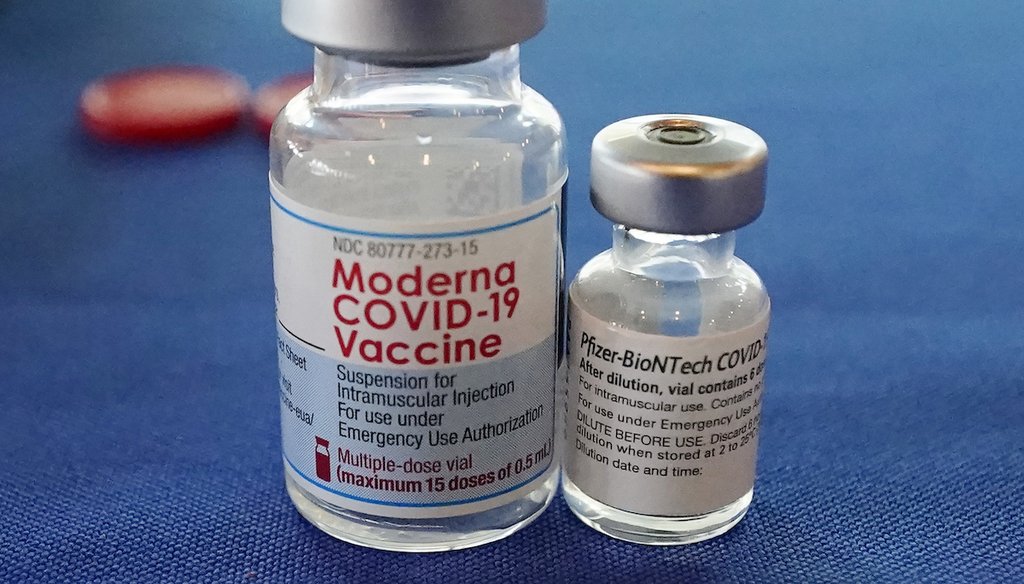

Our only agenda is to publish the truth so you can be an informed participant in democracy.
We need your help.


(AP)
Moderna is suing Pfizer and BioNTech for patent infringement, alleging the rival companies used key parts of its mRNA technology to develop their COVID-19 vaccine. Moderna’s patents were filed between 2010 and 2016.
Vaccines using mRNA technology date back to the 1990s, but the first-time mRNA vaccines were widely disseminated was to combat the spread of COVID-19.
Scientists have also used mRNA technology to study other viruses including the flu, Zika and rabies.
Moderna is suing Pfizer and BioNTech, alleging its rivals used vaccine technology that Moderna developed years ago. But some social media users are pointing to the lawsuits as proof the COVID-19 vaccine was created before the pandemic started.
"Thumbs up if you knew this all along," read an Aug. 26 Instagram post that used screenshots of news articles about the COVID-19 vaccine and the lawsuit to suggest a pre-pandemic vaccine conspiracy.
The first screenshot was of a Sept. 16, 2021 fact-check by Reuters with the headline, "COVID-19 vaccine was not being developed before the outbreak." The second screenshot showed an Aug. 26 CNBC article with the headline, "Moderna sues Pfizer/BioNTech for patent infringement over Covid vaccine."
A third screenshot called attention to part of the CNBC article that said the Moderna lawsuit alleges Pfizer and BioNTech "copied (vaccine) technology that Moderna developed years before the pandemic."
This post was flagged as part of Facebook’s efforts to combat false news and misinformation on its News Feed. (Read more about our partnership with Facebook.)
Moderna and Pfizer-BioNTech both used messenger RNA technology, or mRNA technology, to develop their COVID-19 vaccines. This technology dates back to the 1990s, but the first time mRNA vaccines were widely disseminated was to combat the spread of COVID-19.
Vaccines using mRNA technology give the body’s cells directions for how to make a harmless spike protein, which is what’s on the surface of the virus that causes COVID-19. The immune system of a person who receives an mRNA vaccine can then spot unknown proteins and make antibodies to fight off an infection.
Scientists began the first trials for the COVID-19 vaccine in March 2020. Both the Pfizer-BioNTech and Moderna vaccines were granted emergency use authorization by the Food and Drug Administration in December 2020.
Before the COVID-19 pandemic, mRNA vaccines were used to study viruses, such as the flu, Zika and rabies.
Vaccines that don’t use mRNA technology are generally made from dead and inactivated viruses or parts of a living virus that have been weakened.
On Aug. 26, Moderna filed two patent infringement lawsuits, alleging that Pfizer and BioNTech had used key features of Moderna’s technology to make their own COVID-19 vaccine. One lawsuit was filed in District Court in Massachusetts, where Moderna is based; the other was filed in Germany, where BioNTech is headquartered.
The lawsuits claim Pfizer and BioNTech infringed patents Moderna filed between 2010 and 2016 on its mRNA technology. That technology was critical to the development of both companies’ COVID-19 vaccines after the start of the pandemic.
In October 2020, Moderna pledged not to enforce its patents related to COVID-19 while the pandemic continued, the company said in a press release. Last March, Moderna updated its policy to continue exempting low- and middle-income countries from its COVID-19 patent enforcement. But Moderna said it expects companies like Pfizer and BioNTech to respect its intellectual property rights.
Moderna’s lawsuits do not seek to remove Pfizer and BioNTech’s vaccine from the market or prevent its future sale. However, Moderna is seeking damages incurred since March, when the company said it would start enforcing its COVID-19 patent in wealthy countries, such as the U.S.
In response to Moderna’s lawsuits against Pfizer and BioNTech, an Instagram post suggested the COVID-19 vaccine was created years before the pandemic began.
Moderna is suing Pfizer and BioNTech for patent infringement, alleging the rival companies used Moderna’s mRNA technology to make their own COVID-19 vaccine. Moderna filed patents for this technology between 2010 and 2016. The first COVID-19 vaccine was approved for emergency use in December 2020.
Although the patents existed before the pandemic began, this does not mean Moderna or Pfizer-BioNTech were already working on the COVID-19 vaccine. Scientists have used mRNA technology to study other viruses, such as the flu, Zika and rabies.
We rate this claim False.
Instagram post, Aug. 26, 2022
Moderna, "Moderna Sues Pfizer And Biontech For Infringing Patents Central To Moderna's Innovative mRNA Technology Platform," Aug. 26, 2022
Centers for Disease Control and Prevention, "Understanding mRNA COVID-19 Vaccines," July 15, 2022
Centers for Disease Control and Prevention, "Understanding How Vaccines Work," May 23, 2022
Food and Drug Administration, "FDA Approves First COVID-19 Vaccine," Aug. 23, 2021
National Institutes of Health, "Experimental coronavirus vaccine is safe and produces immune response," July 21, 2020
PolitiFact, "Ask PolitiFact: How can COVID vaccines be safe when they were developed so fast?," March 29, 2021
Reuters, "Fact Check-COVID-19 vaccine was not being developed before the outbreak," Sept. 21, 2021
CNBC, "Moderna sues Pfizer/BioNTech for patent infringement over Covid vaccine," Aug. 26, 2022
NPR, "Moderna sues Pfizer over COVID-19 vaccine patents," Aug. 26, 2022
The New York Times, "Moderna Sues Pfizer and BioNTech Over Covid Vaccine Technology," Aug. 26, 2022
In a world of wild talk and fake news, help us stand up for the facts.
